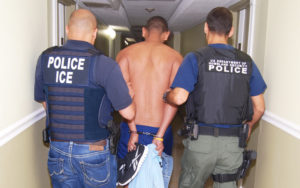Appleseed Network Immigration Collaborative Released Practice Guide
 Chicago Appleseed worked with National Appleseed’s co-chair Steven Schulman, the law firm of Akin Gump, and other Appleseed Centers (South Carolina, Nebraska and Texas) to create and distribute a manual on deportation issues for immigration attorneys. The manual was completed in December 2016, and Centers will continue to update the manual as necessary. The six sections cover: working with a client in detention; obtaining client documents from the government; working with the Department of Homeland Security during pre-trial; working with interpreters in immigration courts; videoconferencing; and reporting misconduct. The manual includes stories from practitioners, sample documents and references to many additional resources.
Chicago Appleseed worked with National Appleseed’s co-chair Steven Schulman, the law firm of Akin Gump, and other Appleseed Centers (South Carolina, Nebraska and Texas) to create and distribute a manual on deportation issues for immigration attorneys. The manual was completed in December 2016, and Centers will continue to update the manual as necessary. The six sections cover: working with a client in detention; obtaining client documents from the government; working with the Department of Homeland Security during pre-trial; working with interpreters in immigration courts; videoconferencing; and reporting misconduct. The manual includes stories from practitioners, sample documents and references to many additional resources.
In conjunction with the release of the manual, the Appleseed Network Immigration Collaborative is working with local and national organizations to increase pro bono representation in immigration bond courts and other proceedings. Immigrants with counsel are at least twice as likely to be successful in in removal proceedings as those without. Bond hearings present an excellent point of entry for pro bono limited appearance representation and offer a meaningful pro bono experience for attorneys unable to commit to a full litigation schedule.
For 2016, Congress approved $1.7 billion to maintain an average of 34,040 daily detention beds for Immigration  and Customs Enforcement. This capacity has nearly doubled in the last 10 years.
and Customs Enforcement. This capacity has nearly doubled in the last 10 years.
While there are ICE detention facilities in almost every state, detainees are generally held in regional facilities far from home. Even though immigration detention is civil, not criminal, the facilities are generally run like prisons and often have very limited visiting hours. ICE does not provide interpreters at their facilities.
Bond is available for a well-identified set of detainees but it is left to the court’s discretion. Bond hearings generally happen within a few weeks of the request for one and are often conducted over the phone. The reality of immigration detention makes preparing for removal proceedings very challenging for both represented and unrepresented immigrants. Bond can have a significant positive impact on the removal proceeding.
Release on bond also allows persons facing removal to remain at home with their families for as long as possible. A person released on bond can also petition to have their case heard in an immigration court closer to home, easing the burden on immigrants and their families when it is time for removal proceedings.
On average over the last ten years, nearly 400,000 persons are deported from the U.S. annually. In 2016, roughly 1/3 of detainees who had a bond hearing had their motion for bond granted. However, in 2015, about 1 in 5 detainees granted bond was unable to post the bond and remained in detention; fully half of all bonds set were between $4,000 and $10,000. The need for legal assistance in immigration courts is obvious.
If you are interested in getting involved with the great pro bono programs springing up in this era of heightened awareness of immigration proceedings, AILA has an immigration bond court program with an upcoming training on March 9 at Chicago Volunteer Legal Services.
You can contact Malcolm Rich at Chicago Appleseed to become involved with our working group or committee.
